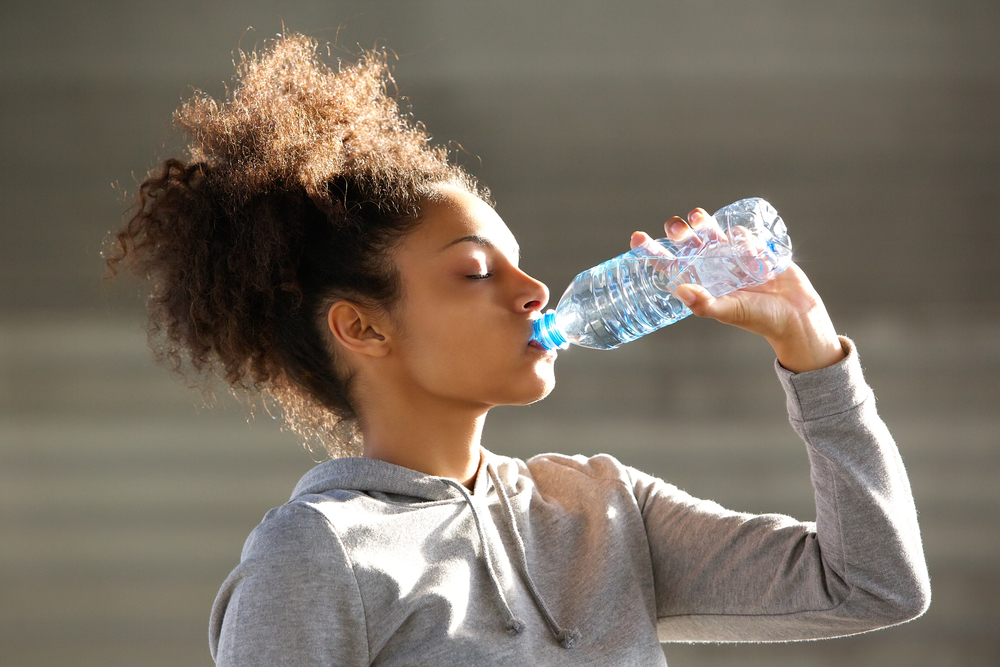Making the Netherlands healthier
Half of all Dutch adults are overweight, which makes them more susceptible to corona. A healthier lifestyle may help mitigate the effects of a COVID-19 infection and help prevent various chronic illnesses. This alleviates the pressure on health care and gives us a head start in future pandemics. Wageningen researchers join forces with governments, health care, food suppliers and schools to learn how we may make a healthier lifestyle more accessible. Do you think small steps, such as a daily serving of fruit and a walk, can make a difference?
‘Working on a healthier lifestyle is of crucial importance for the sick, the burdened health care sector and, from a public health perspective, for those who are not getting sick’, says Emely de Vet, professor of Consumption and Healthy Lifestyles.
Even without the corona crisis, health care services are already extremely burdened by lifestyle-related diseases, De Vet explains. ‘And now the pressure is immense, in part because patients suffering from COVID-19 who also have underlying conditions such as severe excess weight or diabetes are more frequently admitted to the ICU.’
Properly functioning immune system
An unhealthy lifestyle increases the chance to develop chronic diseases such as hypertension, type 2 diabetes and cardiovascular diseases. These illnesses make us more vulnerable to a more serious progression of COVID-19. ‘A healthy lifestyle contributes to a properly functioning immune system and is a crucial factor in preventing diseases, as well as in treatment and disease management’, De Vet explains.
“There is no single measure or lifestyle intervention that works for everyone. But, with different policies and measures, we can redirect our society towards a path that fosters healthy living.”
Unhealthy supply
There is work to be done, as half of the Dutch adults are, for example, overweight. ‘There is variation in age and income groups. Those who are over fifty are more frequently overweight, as well as people in the lower-income groups.’
The professor hastily stresses that being overweight is not a matter of personal choice. ‘It is a societal issue. As long as 80 per cent of the selection of products on sale in supermarkets is unhealthy, it is very difficult for people to alter their lifestyle.’
Inequality
The socio-economic environment also plays a role. People with a lower income, lower education and a poorer employment position are more vulnerable. This group struggles with health issues such as obesity and diabetes more frequently, both of which are risk-factors in COVID-19. ‘Corona painfully exposes socioeconomic inequality and further amplifies the disparities, De Vet points out.
For most workers in hands-on and lower-wage professions, working from home is barely an option. Leading a more healthy lifestyle is barely a priority for those who suffer from stress as a result of financial difficulties, unemployment and other issues. ‘And even less so if healthy products are more expensive than unhealthy alternatives. A healthy lifestyle is a luxury not everyone can afford’, the professor states.
She goes on to say: ‘People with lower incomes and a lower education have a life expectancy that is seven years lower than those with higher educations. Moreover, they expect to live 19 years less in good health during their lifetime. Differences such as these in the Netherlands are ridiculous.’
Companies, organisations and individuals are constantly trying to influence our behaviour. How do you resist temptations and what influence does your environment have? Emely de Vet will tell you everything about it (Dutch, with English subtitles)
Strategy for healthy choices
De Vet and her colleagues investigate what strategies and interventions may lead to healthier lifestyles, behaviour and living conditions. To this end, they draw on a variety of disciplines and methods from health sciences, psychology, sociology, pedagogy, geography and anthropology. ‘To understand human behaviour and design interventions calls for a broad perspective.’
Many agencies
Some interventions centre on reducing the health deficit in vulnerable groups. De Vet’s research group is involved in the public health academic collaborative centre Agora, with the GGD-North and East Gelderland (GGD stand for the Dutch public health services) and 22 municipalities.
The Samen aan zet (doing it together) project in Harderwijk also falls within this collaborative centre. This is a project involving people with multi-faceted problems, such as debt and health issues. ‘These people fall within the scope of many different agencies, such as the municipality, youth care, schools, debt rescheduling, housing association, general practitioner and other caregivers. They carry the burden of enormous stress and worry and often lack the reserves to improve their lifestyle.’
Not in an ivory tower
‘With all of the parties involved, we try to discover how we can offer these people a single point of contact and deploy their social environment to address their multi-problem situation, including their unhealthy lifestyle. We study what is helpful in collaboration with policymakers and the “boots on the ground”. Thus, we scientists are not in a remote ivory tower but directly involved to see what works. Moreover, effective solutions can be applied in practice without delay.’
Dies Natalis: Pandemic preparedness
Wageningen University & Research celebrates its 103rd birthday, the Dies Natalis, on Tuesday 9 March 2021. The traditional event is to take place online due to the corona measures. During the event, entitled Pandemic Prevention, Prediction and Preparedness, experts, moderated by Marcia Luijten, will discuss these issues.
Henk Bekedam, former WHO-representative in China and India, virologist Marion Koopmans of Erasmus MC, Wageningen virologist Wim van der Poel and health scientist Emely de Vet are to discuss how science can contribute to better understanding and addressing future pandemics.
– More information and registration on this online event, which is English spoken
– Read: Rector on Dies Natalis: ‘WUR has the expertise needed to tackle a pandemic’
– Read the interviews with virologist Wim van der Poel: Never again do we want to be caught off-guard by a virus & Staying ahead of viruses
Dieticians and physiotherapists
Additionally, the researchers contribute to lifestyle programmes in the health care sector, such as the SLIMMER (Dutch for smarter) programme that is covered by health insurances since 2019. SLIMMER is implemented by physicians, dieticians, physiotherapists, lifestyle coaches and local sports clubs and targets people with an elevated risk of diabetes. Wageningen researchers helped refine and evaluate this lifestyle intervention. The GGD North and East Gelderland is now offering this programme in collaboration with the Academic Collaborative Centre.
Other research in health care centres on digital tools, such as apps, that support patients in changing their behaviour.
Dockworkers
Employers, too, can initiate interventions. Many workers in the Netherlands live in poverty and often have an unhealthy lifestyle, De Vet says. ‘However, the hierarchy between employer and employee makes this more complicated. We lead a project for low-educated employees on the docks and in sheltered employment. We explore how we may better match both parties’ needs for health support through dialogues with workers and employers.’
Nutrition education in school
Habits are formed at an early age, which are difficult to break later on in life. This was discovered through research conducted by De Vet and her colleagues. ‘Research shows that eating habits and being overweight at an early age are accurate indicators of habits during adulthood. If children learn unhealthy eating habits at an early age, it becomes difficult to fix. Old habits die hard is a saying that certainly applies to our eating behaviour. This is why we petition in favour of nutrition education in schools.’

‘Focus on healthy nutrition in school impacts the eating habits of children who may not be offered fruits and vegetables at home, and is thus essential in the fight against health deficits.’ Photo: Shutterstock.
Many schools join the Wageningen Taste lessons programme or the EU School Fruit programme that offers schools free fruit for students. ‘Focus on healthy nutrition in school impacts the eating habits of children who may not be offered fruits and vegetables at home, and is thus essential in the fight against health deficits,’ De Vet states. Unfortunately, there is no structural focus on nutrition and health education, and not every school offers such lessons. ‘It would be best to include this in the standard school curriculum so that each child is taught a healthy lifestyle at an early age.’
Banning fast-food
There is a more active role for the government to play in creating a healthier environment. ‘Currently, a legal or governance framework to promote a healthier food environment is lacking. Altering the environment is essential. Consider, for example, banning fast-food restaurants in a 500-meter radius of schools. Such instruments are sorely needed by municipalities.’
However, the government is becoming more active—the National Prevention Agreement, which focuses on reducing overweight, smoking and alcohol consumption, for example. Recently, the Ministry of Health, Welfare and Sport announced it will make 200 million euros available to improve the welfare and lifestyles of vulnerable groups. It is, however, not enough.
Sugar tax
De Vet favours abolishing sales tax on fruits and vegetables, making a healthier diet financially attractive. Increasing taxes on unhealthy products, which are often cheaper, is an alternative. ‘A sugar or fat tax is not a magic bullet, but it can help. Many in The Hague have been calling for such a measure for years, and this plea has gained urgency as a result of the corona crisis.’
The government should also regulate the composition of products, serving sizes and packaging units. ‘Food producers and supermarkets often have great plans to collaborate on a healthier selection of products, but that is where it ends. There is no mandate for enforcement.’

De Vet favours abolishing sales tax on fruits and vegetables, making a healthier diet financially attractive. Increasing taxes on unhealthy products, which are often cheaper, is an alternative. Photo: Shutterstock.
Reluctant
The Netherlands is very cautious in its regulation in comparison to other countries, the professor notes. ‘The UK and Chile are working on reducing soft drinks consumption and have introduced a sugar tax, as have dozens of other countries. This stimulates producers in these countries to design better products.’
Moreover, many countries have regulations that stipulate that food on offer in, for example, cafeterias must be healthy. There is structural attention for nutrition and lifestyle in education, and school children are offered lunch at school. The Netherlands could learn from these examples, according to De Vet.
More resilience against pandemics
We, as citizens, can contribute too. Many interventions focus on small changes in our habits, such as eating sufficient fruits. ‘It may not make a big difference at an individual level, but if the entire population eats two servings of fruit a day, it will make a difference. If we also add ten minutes of exercise to our day, we, as a population, become more resilient in the next pandemic.’ But, De Vet also calls for realism at an individual level. ‘If you have to lose 20 kilos excess body weight, you are not going to solve this by eating enough fruit. In this case, it would be better to consult your doctor for a referral to a proven effective lifestyle programme.’
Lots of patience
Many people work on their health individually. ‘Making a change is difficult, and there is no quick fix. Lifestyle changes require a long time and much patience. Small steps are best.’ Use your bike rather than car more often, eat wholewheat bread, drink water instead of soft drinks. Using a smaller plate can also help and load your plate in the kitchen rather than serving the food in pots and pans on the table. These are a few examples of nudging, through which you influence your behaviour through small changes.

‘Making a change is difficult, and there is no quick fix. Lifestyle changes require a long time and much patience. Small steps are best.’ Use your bike rather than car more often, eat wholewheat bread, drink water instead of soft drinks. Photo: Shutterstock.
Changing the system
‘As a society, however, it is crucial that we approach lifestyle, not as an individual responsibility, but that we change the system that perpetuates an unhealthy lifestyle.’ Lifestyle is complex and does not rest on individual choices because it is embedded in the social system, De Vet declares. ‘There is no single measure or lifestyle intervention that works for everyone. But, with different nudges and measures, we can redirect our society towards a path that fosters healthy living.’


I am Anwaar Anwar, I work as an assistant professor in maternal and child health, Faculty of Nursing, Damanhour University, EgyptAnd I want your help in facilitating the work of your university to do research on nutrition and women’s and children’s health